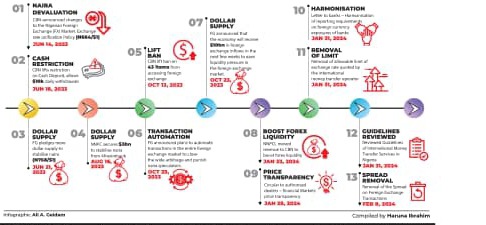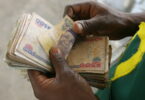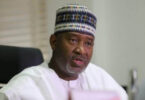
The naira Tuesday slid further at the parallel market in spite of the clampdown the federal government ordered on foreign exchange market speculators.
Bureau De Change (BDC) hubs were raided in Abuja, Lagos and Kano and some operators were arrested.
Despite the raids, however, the naira plunged further with a dollar exchanging for 1,900 in Abuja and Kano, and N1,800 in Lagos; while the British Pound was exchanged for N2,250.
However, at the official market, the naira recorded a marginal gain closing at N1,551.24 as against the earlier N1,574.62, according to the Nigerian Autonomous Foreign Exchange Market (NAFEM).
NSA’s clampdown
Daily Trust reports that the National Security Adviser, Nuhu Ribadu, had earlier yesterday directed operatives of the Nigeria Police Force, the Economic and Financial Crimes Commission (EFCC), the Nigeria Customs Service (NCS) and the Nigeria Financial Intelligence Unit (NFIU) to clamp down on forex market speculators.
This, he said, was a concerted effort to safeguard Nigeria’s foreign exchange market and combat the activities of speculators, both domestic and international, operating through various channels.
Ribadu, in a statement by Zakari Mijinyawa, Head, Strategic Communications in the Office of the NSA, said the office had to wade in at this time because some individuals and organisations had continued to undermine proactive measures of the Central Bank of Nigeria to stabilise the foreign exchange market and stimulate economic activities.
But some experts who spoke to Daily Trust described the move as faulty, saying there are better ways to address the volatility.
The statement from Ribadu said, “The CBN’s proactive measures to stabilize the foreign exchange market and stimulate economic activities have been commendable.
“However, the effectiveness of these initiatives is being undermined by the activities of speculators, both domestic and international, operating through various channels, thereby exacerbating the depreciation of the Nigerian Naira and contributing to inflation and economic instability.
“To reduce the pressure on the naira, the EFCC raised a 7,000-man special task force across its 14 zonal commands to clamp down on dollar racketeers.
“Yet, recent intelligence reports have highlighted continued illicit activities within the Nigerian foreign exchange market. The ONSA and CBN are therefore embarking on this collaborative approach to tackle these infractions.
“This partnership will involve a coordinated effort with key law enforcement agencies, including the Nigeria Police Force, the EFCC, the Nigeria Customs Service and the Nigeria Financial Intelligence Unit (NFIU).
“The primary objective of this alliance is to systematically identify, thoroughly investigate and appropriately penalize individuals and organizations involved in wrongful activities within the FX market,” the official said.
The NSA said by leveraging the expertise of those four security agencies, the government aimed at deterring what he described as “malicious practices”, in order to protect investors’ interests and promote sustainable economic growth.
Acting on the NSA’s directive, the security operatives swooped on the streets of Lagos, Abuja and Kano yesterday to raid unlicensed BDC operators.
At the popular Allen Avenue in Lagos, about five BDC operators were reportedly arrested when the EFCC operatives stormed the area around 10am.
Many of the unlicensed operators transacting by the road fled on sighting the security operatives.
An operator said: “They came to our place today; they said we are the ones responsible for the hike in foreign exchange. All of us had to take to our heels for fear of arrest.”
Another said five of his colleagues were arrested during the raid, adding, “Many of us have run away now and we are monitoring the situation.”
Dollar sells for N1,870 in Kano
A dollar was exchanged for N1,870 at the popular Wapa Bureau de Change market on Tuesday.
An operator, Ammar Aminu, said though no EFCC operative visited the market for a clampdown on forex speculators, the price of the dollar kept going up.
He said, “Today, the dollar has risen to N1,870 from N1,750 it was sold on Monday.”
Normal trading activities were ongoing when our correspondent visited the area.
Raid in Abuja
Bureau De Change operators in Abuja confirmed that EFCC operatives raided the popular Zone 4 business area.
Some of the operators, who spoke to Daily Trust, said the operatives came in their numbers on Monday.
A BDC operator, Gidado Muktar, said: “We were just on our own when we saw operatives of the EFCC in their numbers in over three Hilux vans storm our vicinity at Zone 4 and the next thing we saw was that they started arresting some of our members. They put them in their vans and drove off.
“What I was told later was that they were acting on a tipoff that some people were hoarding dollars and that was why they came and effected arrests.”
Another operator, Mustapha Ibrahim said: “The way and manner the EFCC came was shocking; as if the BDCs were the ones responsible for the naira’s fall.”
Raid not way to go – Economist
An economist, Dr Oluseye Ajuwon, in an interview with Daily Trust yesterday, said clamping down on BDC operators was not the solution to the foreign exchange crisis.
Ajuwon, a lecturer at the Department of Economics, University of Lagos, said the raid was like compounding the problem.
“There are some kinds of forex demands that you cannot go to banks to do. You have to resort to all these BDCs. The way they (the government) are going about it now is like pushing them into a darker place.
“The implication of that is that it would now become more expensive. I don’t see it solving any problem. Rather, it would compound the problem.
“What will create hoarding is if there is scarcity. If you can’t remove scarcity, there will be hoarding. If we really want to solve the problem, just remove the scarcity.
“Everything they (government) are doing now is a short-time measure. What they are doing now is trial and error and the way they are going about it is wrong.”
‘How to stabilize forex market’
An Abuja-based think tank, Agora Policy, in a report titled ‘Steadying Nigeria’s Fledgling Foreign Exchange Reform’, through its financial analyst, Wale Thompson, said it was high time the government embraced a new policy to stabilise the market.
According to the analyst, mere FX adjustments to adapt to reality “may lead to short-lived gains, followed by a return to previous practices.”
He said, “To avoid this cycle, forex and monetary policies should be part of a comprehensive economic plan where the exchange rate serves as a tool for export diversification and for attracting capital flows to foster overall development. Successful fixed-to-floating transitions are characterized by certain key features.
“The long-stated objective of Nigeria’s policymakers is to diversify its export base which, given Nigeria’s labour abundance, distils to ensuring that industrial activity is geared towards the production of exportable goods that use a lot of low-skilled labour that is abundant in Nigeria.
“To ensure export competitiveness of these non-oil exports, exchange rate policies must look to deliver an extra layer of competitiveness to export prices in a form that favours domestic industries,” the analyst added.











Leave a Comment